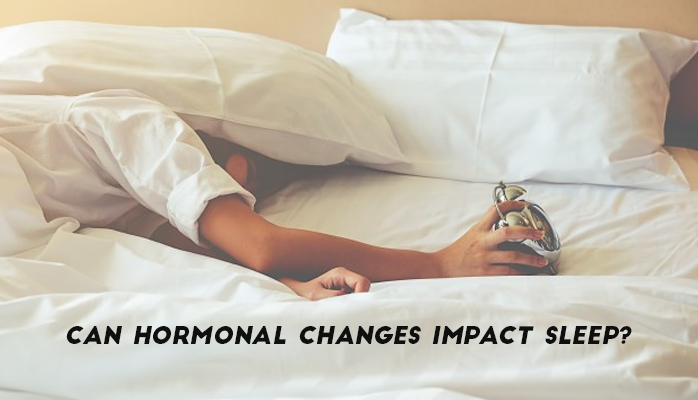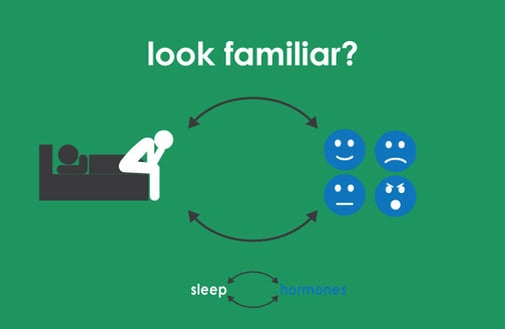
In the life of an average woman, she will experience 7 significant hormonal shifts. These shifts occur during puberty, during adult menstrual years, during pregnancy, postpartum, twice during perimenopause, and post-menopause.
It's no surprise, then, that the National Sleep Foundation reports that women are much more likely to report sleep problems than men. Hormones may be entirely to blame for this phenomenon given that hormonal fluctuations have a direct relationship with quality of sleep.
About Estrogen and Progesterone
Of the body's 50 hormones that work to operate specific biological functions, estrogen and progesterone are the most important for females. These two hormones go through dramatic shifts in a woman's life depending on a woman's age and environmental factors.
Estrogen is a hormone produced by the ovaries first during puberty. Estrogen is released in line with each monthly menstrual cycle. When estrogen rises halfway through a woman's cycle, an egg is released triggering the quick decrease of estrogen production. Estrogens typically travel through the bloodstream in fluids and interact with cells in numerous tissues in the body. They also are messengers and deliver instructions.
Progesterone is a hormone mainly secreted by the corpus luteum in the ovary during the second half of a woman's cycle. Progesterone is important because it prepares the body for pregnancy when the released egg is fertilized. In cases wherein the egg is not fertilized, progesterone levels fall and a new cycle will begin. This hormone plays an important role in maintaining the early stages of pregnancy.
These vitally important hormones play a role in promoting healthy sleep. Specifically, estrogen assists the body in using serotonin to encourage sound sleep at night. It helps women achieve deep sleep wherein awakenings are few and less time is needed to fall asleep. Progesterone balances the effects of estrogen and helps to regulate mood. It's a "feel good" hormone that helps women feel calm and fall asleep with ease. It also increases the production of neurotransmitters that aid in sleep. (The Sleep Doctor)

Hormones impact sleep and sleep impacts hormones
Sleep During Puberty
Clinical psychologist Michael J. Breus, PhD and Diplomate of the American Board of Sleep Medicine, attests that puberty brings about a great deal of change in quality of sleep. According to a study in Sleep journal, researchers found the following as reported by Sharecare Incorporated:
- Adolescents' ability to fall asleep was delayed by 50 minutes
- Total sleep time at night lessened by 37 minutes
- Psychological issues related to school, social life, and technological distractions can lead to the development of bad sleep habits
Avi Sadeh, doctor of science and professor of psychology at Tel Aviv University in Israel, stated, "It is very important for parents to be aware of the importance of sleep to the developing teenager and to maintain their supervision throughout the adolescent years. School health education should also provide children with compelling information on how insufficient sleep compromises their well-being, psychological functioning, and school achievements."
Sleep During Pregnancy
Sleep is also compromised when a woman becomes pregnant. Because hormones fluctuate during pregnancy, there are several side effects that transpire as a result that can cause a woman to lose sleep:
- The frequency of urination causes women to wake at night more often. In pregnant women, kidneys are working harder to filter the increased volume of blood moving through the body. The result is that more urine is produced. Furthermore, the pressure on the bladder increases as the baby grows larger.
- Heart-rate increases can keep pregnant women awake and make it difficult for them to fall asleep at night. The heart rate increases because more blood supply is going to the uterus and more blood is being circulated throughout the mother's body.
- Leg cramps and backaches are caused by extra weight a pregnant woman carries and can cause prolonged pain and be disruptive during sleep.
- Heartburn and constipation are additional complications that arise when the digestive system slows and food stays in the intestines longer. Discomfort from heartburn and constipation can also interfere with a quality night's rest.
Sleep During Menopause
Finally, menopause is a common time in a woman's life when sleep can be impacted by hormonal shifts. Though menopausal symptoms differ from woman to woman, many experience a shift in sleeping patterns due to the decrease of estrogen and progesterone in the body.
The majority of menopausal women experience the most severe sleep disruptions from perimenopause (the menopause transition when the ovaries begin to gradually produce less estrogen) to post-menopause (the phase after menopause has occurred). The changing and decreasing estrogen levels cause a number of changes in women's bodies that can disrupt sleep. Insomnia is one of the most commonly reported symptoms of menopause.
According to the National Sleep Foundation, less than half of perimenopausal women regularly achieve a full night of uninterrupted sleep. Furthermore, problems with sleep increase two to three and a half times for menopausal women. Specifically, many women approaching and in menopause report:
- Sleep onset and sleep maintenance insomnia
- Hot flashes and night sweats
- Obstructive sleep apnea
- Less time in REM sleep
- Restless leg syndrome
Diagnosing a Hormone-Induced Sleep Disorder
If you believe that you or a loved one is suffering from a sleep disorder caused by hormones, it is highly important that you seek help from a professional. Due to the fact that treating hormone-related conditions at home can prove futile and/or dangerous, receiving a medical evaluation from a sleep specialist will help you get the answers you need as quickly and as safely as possible.
At the Anchorage Sleep Center, we offer a variety of solutions for individuals suffering from sleep disorders. If you are interested in learning more, read about sleep solutions, take an online sleep test, or send us a message to see how we can best help you provide guidance on your road to recovery and improve the quality of your sleep.
